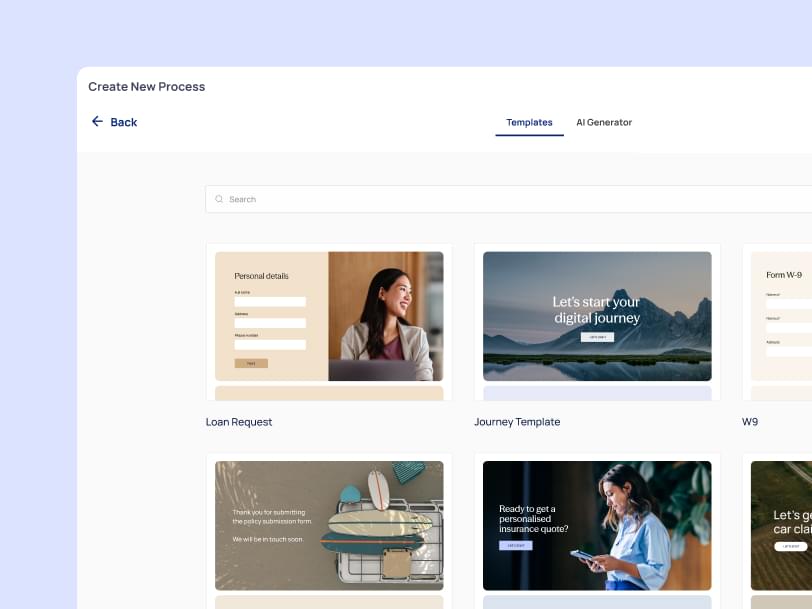TL;DR
Manual loan document collection slows approvals and frustrates borrowers. Replace PDFs and emails with AI-powered, Salesforce-connected workflows that guide applicants, validate documents in real time, and sync data automatically. The result: faster decisions, full compliance, and a better borrower experience.
In lending, document collection is often the most painful part of the process. Between incomplete uploads, missing signatures, and endless email follow-ups, loan origination teams lose hours every week chasing the same data they already requested. Meanwhile, borrowers grow frustrated, application cycles stretch longer, and compliance teams face mounting pressure to track every version of every file.
Today, AI and no-code workflow automation are changing that reality. The next generation of document collection isn’t a folder full of PDFs, it’s an AI-powered, dynamic workflow that knows what to ask, who to ask, and when to ask it.
The problem with manual document collection
Most lenders still rely on static PDFs or basic web forms to collect required materials. A typical loan file may involve:
- A borrower submitting financial statements through email
- A co-signer sending ID and tax documents separately
- A credit officer re-keying data into the CRM
- Compliance verifying uploads manually
Every one of those steps adds friction, introduces errors, and slows approvals. Manual document collection also leaves teams exposed to compliance risks when files are misplaced or incomplete.
In short: the process works, but it doesn’t scale, and it certainly doesn’t meet modern borrower expectations.
What AI-powered automation looks like
AI-driven workflow platforms such as EasySend remove this bottleneck by transforming static forms into guided, intelligent digital journeys. Instead of sending out multiple versions of the same checklist, lenders can deploy a single adaptive workflow that adjusts in real time based on each borrower’s profile, geography, and loan type.
Imagine this:
- A small-business applicant starts a loan request online. The system pre-fills basic information from Salesforce or your LOS.
- Based on entity type and loan size, the workflow instantly generates a personalized checklist: financial statements, ownership docs, or proof of revenue.
- AI validations confirm that uploads meet required formats and size limits.
- If a co-borrower or guarantor needs to sign, they’re automatically invited in the right sequence.
- Once everything is complete, data and documents sync back into Salesforce or your loan-origination platform in real time.
No emails. No waiting. No missing pieces.
Why automation is a game-changer for lenders
1. Faster turnaround times
Real-time validations eliminate back-and-forth for missing or incorrect documents. Borrowers see instantly what’s required, and teams can approve applications days faster.
2. Better borrower experience
Dynamic, mobile-friendly workflows guide applicants step-by-step, adapting to their specific situation. A borrower uploading bank statements on a phone experiences the same smooth flow as one signing from a desktop.
3. Reduced operational overhead
AI handles repetitive tasks like file naming, validation, and routing. Compliance officers review only flagged cases, not every submission.

4. Built-in compliance and traceability
Every action (upload, approval, eSignature) is logged automatically. You maintain a full audit trail that satisfies regulators without extra admin work.
5. Real-time data integration
Because the workflow connects directly to systems like Salesforce, Monday.com, or your LOS, customer data stays synchronized across departments with no manual entry.
How to implement automated document collection
- Map your existing process: Outline who’s involved (borrower, co-signer, underwriter, compliance) and what documents are required for each loan type. This helps identify where automation can have the biggest impact.
- Start with your existing PDFs: With EasySend’s AI PDF Converter, you can upload your current loan forms and generate a digital version automatically, complete with fields, steps, and validation logic.
- Describe the flow in natural language: AI Journey Builder allows you to write prompts such as: “Create a 5-step loan application workflow. Step 1: borrower details (prefill from Salesforce). Step 2: financials and income verification. Step 3: document uploads with type and size checks. Step 4: co-signer details and signatures. Step 5: final review and submission.” Within seconds, you have a working prototype.
- Add business rules and conditions. Use low-code tools to specify: Loan amount thresholds that trigger extra documents, Jurisdiction-specific disclosures, Parallel or sequential signing rules for multiple parties
- Connect your systems: Integrate the workflow with Salesforce objects or your LOS. When a borrower submits documents, data instantly maps to the right records, files are stored with metadata, and notifications go to the next stakeholder.
- Test, launch, and iterate. Because these workflows are no-code, business teams, not developers, can test and refine them continuously. You can adjust steps, wording, or validations in minutes.
Connect your systems.
Real-world impact
Financial institutions using EasySend’s AI-powered document collection have reported:
- 70% reduction in loan onboarding time
- Zero manual follow-ups for missing documents
- Higher borrower satisfaction scores across digital channels
In one case, a mid-sized lender replaced seven PDF versions of a loan packet with a single dynamic journey that automatically adapted by region, amount, and entity type, cutting email exchanges from 10+ to none.
The bottom line
Automating document collection isn’t just about efficiency, it’s about delivering the kind of seamless, trustworthy experience borrowers expect. In an industry defined by regulation and risk management, AI-powered workflows make it possible to stay compliant and move faster.
With EasySend, lenders can transform static loan checklists into intelligent, Salesforce-connected journeys that collect, validate, and route documents automatically, no code, no delays, and no guesswork.





